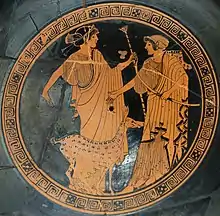Apollo
English

Apollo (1) and Artemis
Pronunciation
- (Received Pronunciation) IPA(key): /əˈpɒləʊ/
- (General American) IPA(key): /əˈpɑloʊ/
Audio (US) (file) - Rhymes: -ɒləʊ
- Hyphenation: Apol‧lo
Etymology 1
From Latin Apollō, from Ancient Greek Ἀπόλλων (Apóllōn).
Proper noun
Apollo
- (Greek mythology, Roman mythology) The son of Zeus and Leto (or Jupiter and Latona), and the twin brother of Artemis (or Diana). He was the god of light, music, medicine, and poetry; and prophecy, dance, manly beauty, and more.
- 1902, John Buchan, The Outgoing of the Tide:
- 'Blue are the hills that are far away,' is an owercome in the countryside, and while at first on his side it may have been but a young man's fancy, to her he was like the god Apollo descending from the skies.
- (astronomy) The planet Mercury, when observed as a Morning Star.
- (astronomy) Short for 1862 Apollo, an Apollo asteroid.
- (NASA, space science) A United States space program, and the vehicles it created, used for human travel to the moon.
- Apollo 11 landed people on the moon for the first time
- (with "the") Apollo Theater, a music hall in New York City associated with African-American performers.
- A butterfly of species Parnassius apollo, a large swallowtail with black and red spots on white wings.
- A very handsome young man.
- A male given name
- A placename.
Antonyms
- (antonym(s) of “astronomy”): Hermes
Derived terms
- (NASA, space): pre-Apollo, post-Apollo
Translations
the son of Zeus
|
a very handsome young man
a three-man spacecraft
See also
Etymology 2
From the object 1862 Apollo.
Noun
Apollo (plural Apollos)
- (astronomy) An asteroid possessing an orbit that crosses the orbit of the Earth and an orbital period of over one year, with semimajor axes greater than 1 AU, and perihelion distances less than 1.017 AU.
Translations
asteroid type
|
- The translations below need to be checked and inserted above into the appropriate translation tables. See instructions at Wiktionary:Entry layout § Translations.
Translations to be checked
|
Anagrams
Italian
Etymology
From Latin Apollō, from Ancient Greek Ἀπόλλων (Apóllōn).
Pronunciation
- IPA(key): /aˈpɔl.lo/, /aˈpol.lo/[1]
- Rhymes: -ɔllo, -ollo
- Hyphenation: A‧pòl‧lo, A‧pól‧lo
Derived terms
References
- Apollo in Luciano Canepari, Dizionario di Pronuncia Italiana (DiPI)
Anagrams
Latin
Alternative forms
Etymology
From Ancient Greek Ἀπόλλων (Apóllōn).
Pronunciation
- (Classical) IPA(key): /aˈpol.loː/, [äˈpɔlːʲoː]
- (modern Italianate Ecclesiastical) IPA(key): /aˈpol.lo/, [äˈpɔlːo]
Declension
Third-declension noun (two different stems).
Synonyms
Derived terms
- Apollināris
- Apollineus
References
- “Apollo”, in Charlton T. Lewis and Charles Short (1879) A Latin Dictionary, Oxford: Clarendon Press
- “Apollo”, in Charlton T. Lewis (1891) An Elementary Latin Dictionary, New York: Harper & Brothers
- Apollo in Gaffiot, Félix (1934) Dictionnaire illustré latin-français, Hachette.
- “Apollo”, in The Perseus Project (1999) Perseus Encyclopedia
- “Apollo”, in Harry Thurston Peck, editor (1898), Harper's Dictionary of Classical Antiquities, New York: Harper & Brothers
- “Apollo”, in William Smith, editor (1848), A Dictionary of Greek and Roman Biography and Mythology, London: John Murray
Middle English
Polish
Etymology
Learned borrowing from Latin Apollō, from Ancient Greek Ἀπόλλων (Apóllōn).
Pronunciation
- IPA(key): /aˈpɔl.lɔ/
Audio (file) - Rhymes: -ɔllɔ
- Syllabification: A‧pol‧lo
- Homophone: apollo
Declension
Declension
Declension of Apollo
| singular | plural | |
|---|---|---|
| nominative | Apollo | Apollowie |
| genitive | Apolla/Apollona | Apollów/Apollonów |
| dative | Apollowi/Apollonowi | Apollom/Apollonom |
| accusative | Apolla/Apollona | Apollów/Apollonów |
| instrumental | Apollem/Apollonem | Apollami/Apollonami |
| locative | Apollu/Apollonie | Apollach/Apollonach |
| vocative | Apollu/Apollonie | Apollowie |
Portuguese
Swedish
Etymology
Ultimately from Ancient Greek Ἀπόλλων (Apóllōn).
This article is issued from Wiktionary. The text is licensed under Creative Commons - Attribution - Sharealike. Additional terms may apply for the media files.